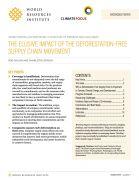Mengakhiri Deforestasi Hutan Tropis: Dampak Elusif Gerakan Rantai Pasokan Bebas-Deforestasi

Ringkasan
Ratusan perusahaan yang berdampak pada deforestasi akibat produksi kelapa sawit, daging sapi, kedelai, atau kayu telah berkomitmen untuk melawan deforestasi. Banyak dari komitmen tersebut telah tertuang dalam komitmen Consumer Goods Forum Zero Net Deforestation, Tropical Forest Alliance (TFA 2020), dan New York Declaration on Forests (NYDF), serta menetapkan tahun 2020 sebagai target untuk menghilangkan deforestasi dari rantai pasok komoditas pertanian. Dengan semakin dekatnya batas waktu tersebut, ini saat yang tepat untuk meninjau status komitmen tersebut serta mengidentifikasi hambatan yang dihadapi para perusahaan. Laporan ini merangkum progres yang telah tercapai, mengidentifikasi tantangan dan gap yang ada, serta merekomendasikan aksi tambahan yang bisa membantu mengurangi deforestasi akibat komoditas.
Temuan Utama
Publikasi ini untuk sementara hanya tersedia dalam Bahasa Inggris.
- Coverage is insufficient. Deforestation-free commitments do not adequately cover the full range of commodities, geographies, markets, and supply chain segments with forest risks. On the producer side, few small and medium-sized producers are covered by commitments, and on the consumer side, manufacturers and retailers in emerging economies are less likely to have a commitment than larger companies in Europe or North America.
- The impact is unclear. The ambition, scope, and specificity of company commitments varies enormously, as do companies’ level of effort and approaches to managing deforestation risk. This results in a dearth of information to assess companies’ performance in meeting their commitments and the impacts on deforestation.
- Companies cannot curb deforestation on their own. Company supply chain efforts can only succeed if complemented by aligned public sector measures that improve land sector governance, enable sustainable rural development, and create incentives to conserve forests.
